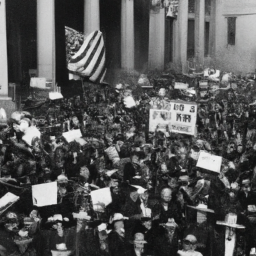The 1912 presidential election was a significant moment in American history. It marked the rise of progressivism, a political movement that sought to address social and economic issues through government intervention. The election saw four major candidates running for office: incumbent Republican President William Howard Taft, former President Theodore Roosevelt (running as a third-party candidate), Democrat Woodrow Wilson, and Socialist Eugene V. Debs.
Theodore Roosevelt's decision to run as a third-party candidate, representing the Progressive Party (also known as the Bull Moose Party), was a major factor in the election. Roosevelt had become increasingly disillusioned with Taft, his former protege, and believed that the Republican Party had become too beholden to corporate interests. He ran on a platform that called for government regulation of big business, workers' rights, and conservation.
The election was also significant because it marked a shift in the way Americans viewed the role of government. Progressives believed that the government had a responsibility to protect the welfare of its citizens and to regulate the excesses of big business. This was a departure from the laissez-faire policies of the past, which held that the government should not interfere in the economy.
Woodrow Wilson, the Democratic candidate, also ran on a progressive platform. He called for lower tariffs, the creation of a Federal Reserve System, and the establishment of antitrust laws. Wilson was able to win the election with a majority of the electoral vote, although he only received 42 percent of the popular vote.
The election had a significant impact on American politics. It marked the end of the Republican Party's dominance and the beginning of a new era of progressive politics. The government began to take a more active role in regulating the economy and protecting workers' rights. The election also marked a shift in the way Americans viewed the role of government.
Theodore Roosevelt's campaign was notable for its energetic and charismatic style. He traveled around the country, giving speeches and meeting with voters. During one speech in Milwaukee, he was shot in the chest by a would-be assassin. Despite the wound, he continued to deliver his 90-minute speech, saying "I don't know whether you fully understand that I have just been shot; but it takes more than that to kill a Bull Moose."
The 1912 election also saw the rise of the Socialist Party, which was led by Eugene V. Debs. Debs ran on a platform that called for the nationalization of industries, the establishment of a minimum wage, and the abolition of child labor. Although he did not win the election, he was able to garner nearly a million votes, a significant achievement for a third-party candidate.
The election was also significant for its impact on women's suffrage. Both the Republican and Progressive parties included support for women's suffrage in their platforms, while the Democratic Party did not. This helped to galvanize the women's suffrage movement and bring attention to the issue.
In conclusion, the 1912 presidential election was a turning point in American history. It marked the rise of progressivism and the beginning of a new era of government intervention in the economy. Theodore Roosevelt's campaign, the rise of the Socialist Party, and the impact on women's suffrage were all significant factors in the election. The election serves as a reminder of the importance of political engagement and the power of the vote to shape the future of the nation.
